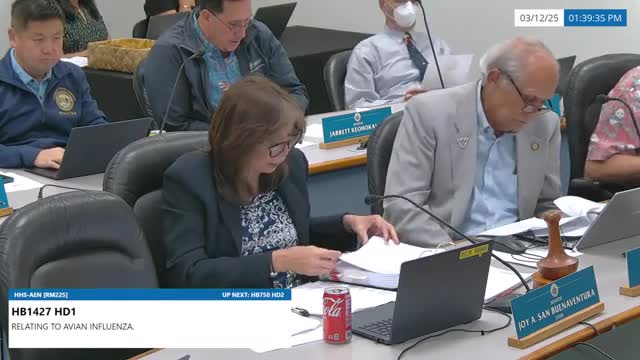Avian influenza bill advances after heated public testimony; DOH and Ag detail response needs
Get AI-powered insights, summaries, and transcripts
Subscribe
Summary
HB1427, a bill to fund avian influenza preparedness and response, drew protests and concerns about vaccine policy from community members but received technical support from the Department of Health and Department of Agriculture, which outlined depopulation protocols and the need for funding and coordination.
HB1427, a measure aimed at avian influenza planning and response, prompted vocal public testimony and extensive questioning of state health and agriculture officials during a joint Senate hearing.
The Department of Health and Department of Agriculture testified in support of the bill, describing the mechanics of outbreak response and the zoonotic concerns that drive the proposal. "Our concern on the human side is that the more the virus is spreading, the more chance for it to evolve and for that transmission to increase," Nathan Tan, Deputy Chief of the Disease Outbreak Control Division, said, outlining the state’s surveillance and communication role.
Agriculture officials described federal protocols for controlling highly pathogenic avian influenza in animal populations. Isaac Mada of the Department of Agriculture explained that the USDA approach has included "stamping out" infected flocks and that infected flocks often die rapidly; depopulation is used to limit viral load and spread.
Public opposition and concerns: Several public witnesses opposed the bill or raised concerns about proposed appropriations and vaccination. Opponents questioned the need for a large appropriation when documented human cases in the U.S. remain rare and argued for alternatives such as enhanced biosecurity and voluntary measures. One witness raised vaccine safety concerns and described skepticism about mRNA technologies; other speakers called for more precise appropriation details.
DOH clarified that the funding request does not include purchases of human vaccines and that the appropriation would support preparedness, surveillance and response capacity including laboratory and field resources. DOH also said the agency would provide itemized cost information to the Ways and Means Committee.
Committee action: The chairs recommended passing HB1427 with amendments and noted agency budget requests in the committee report (Department of Agriculture requested $2,300; Department of Health requested $3.3 million to $4.7 million). Senators recorded reservations but the committees adopted the recommendation to advance the bill for further fiscal review.
Ending: Senators asked DOH and Agriculture to supply detailed cost breakdowns, and some members flagged interisland bird movement and transport rules as a potential immediate policy lever if risk indicators rise.
